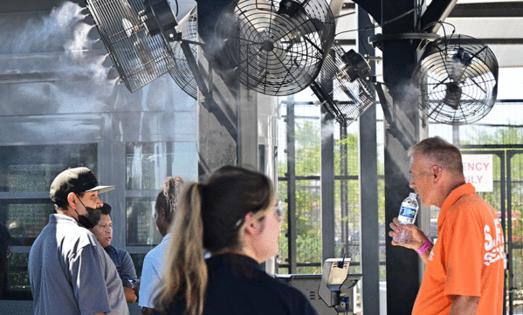Clark County heat deaths spike as coroner investigations continue
Published in News & Features
At least 114 people have died this year in the Southern Nevada heat, according to the Clark County coroner’s office.
The Thursday update is a rise from earlier this month, when the coroner reported 87 deaths in which heat was a factor. It’s not quite been as hot as it was in 2024, when Las Vegas hit an all-time record of 120 degrees and meteorologists said the summer was the valley’s hottest to date overall.
July was considered Las Vegas’ coolest since 2015, but it still dealt triple-digit high temperatures, with the exception of five days that stayed below 100 degrees.
It’s difficult to draw year-to-year comparisons this early because the coroner’s office doesn’t release updates on the same day each year, and most cases take up to 90 days to investigate. But the numbers seem to represent a decrease when compared with last August: On Aug. 29 of last year, 181 people had died in the heat — up from 123 people on Aug. 13.
The total for 2024 was 527 heat-related deaths — the most ever recorded, though the coroner widened its umbrella for determining when heat is a factor in someone’s death in 2021. That still is likely an undercount, experts say.
Because some families haven’t been notified of a loved one’s death, the coroner’s office provided detailed information about only 101 of the 114 heat-related deaths this year.
Previously, in the investigation “A fatal forecast,” The Las Vegas Review-Journal reported that the risk factors contributing the most to susceptibility to heat illness include old age, drug use and prolonged exposure because of homelessness.
The median age of those identified Thursday is 63, but one victim was as young as 26. Victims who skew younger generally had been using drugs, including all seven under the age of 35.
Extreme heat and its human effects have been the focus of much discussion as local governments and nonprofits decide how to best prevent deaths like these. Clark County has pockets of cities with more pavement and less green spaces, called urban heat islands, meaning ZIP codes can determine how intense a heat wave is for some in the valley.
The Nevada Heat Lab, a team of three researchers at the Desert Research Institute, has been providing analysis to better guide future policy on urban heat, such as more effective cooling stations and valley-wide tree planting.
©2025 Las Vegas Review-Journal. Visit reviewjournal.com.. Distributed by Tribune Content Agency, LLC.







Comments